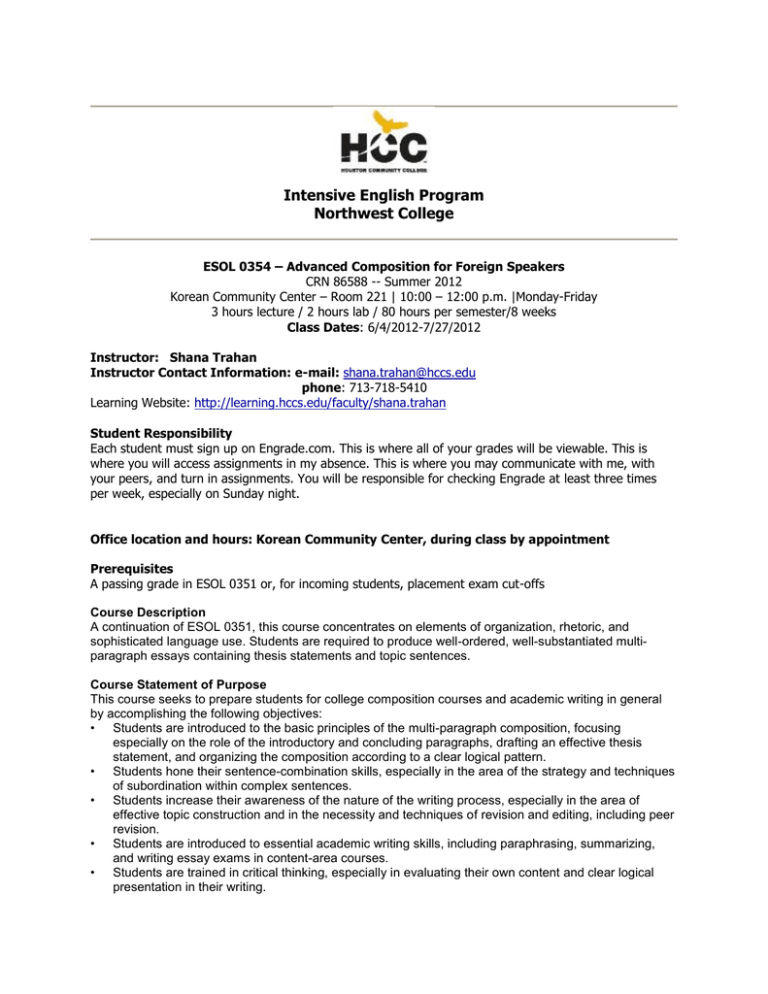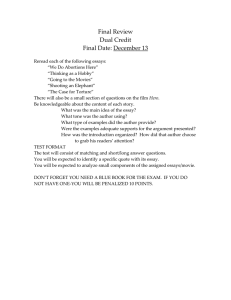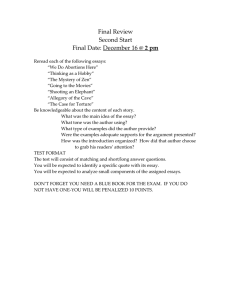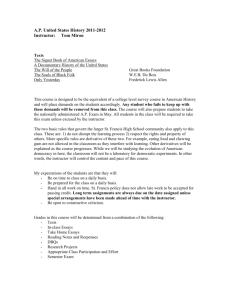
Intensive English Program
Northwest College
ESOL 0354 – Advanced Composition for Foreign Speakers
CRN 86588 -- Summer 2012
Korean Community Center – Room 221 | 10:00 – 12:00 p.m. |Monday-Friday
3 hours lecture / 2 hours lab / 80 hours per semester/8 weeks
Class Dates: 6/4/2012-7/27/2012
Instructor: Shana Trahan
Instructor Contact Information: e-mail: shana.trahan@hccs.edu
phone: 713-718-5410
Learning Website: http://learning.hccs.edu/faculty/shana.trahan
Student Responsibility
Each student must sign up on Engrade.com. This is where all of your grades will be viewable. This is
where you will access assignments in my absence. This is where you may communicate with me, with
your peers, and turn in assignments. You will be responsible for checking Engrade at least three times
per week, especially on Sunday night.
Office location and hours: Korean Community Center, during class by appointment
Prerequisites
A passing grade in ESOL 0351 or, for incoming students, placement exam cut-offs
Course Description
A continuation of ESOL 0351, this course concentrates on elements of organization, rhetoric, and
sophisticated language use. Students are required to produce well-ordered, well-substantiated multiparagraph essays containing thesis statements and topic sentences.
Course Statement of Purpose
This course seeks to prepare students for college composition courses and academic writing in general
by accomplishing the following objectives:
• Students are introduced to the basic principles of the multi-paragraph composition, focusing
especially on the role of the introductory and concluding paragraphs, drafting an effective thesis
statement, and organizing the composition according to a clear logical pattern.
• Students hone their sentence-combination skills, especially in the area of the strategy and techniques
of subordination within complex sentences.
• Students increase their awareness of the nature of the writing process, especially in the area of
effective topic construction and in the necessity and techniques of revision and editing, including peer
revision.
• Students are introduced to essential academic writing skills, including paraphrasing, summarizing,
and writing essay exams in content-area courses.
• Students are trained in critical thinking, especially in evaluating their own content and clear logical
presentation in their writing.
Student Learning Outcomes
After completing this course, students should be able to:
1. Demonstrate a working knowledge of major mechanical rules for English composition.
2. Compose connected discourse using logical devices and coherence markers of academic English.
3. Revise errors in sentence structure in student writing.
4. Compose a well-organized, fluent and grammatically correct multi-paragraph English composition
using a variety of established rhetorical modes of organization, and following a clearly elaborated
writing process.
Learning Objectives leading to the Course Outcomes above
Students will:
1.1 Apply rules of capitalization, including proper names, names of cities and countries, capitalization
within quotations, and other rules as appropriate;
1.2 Apply punctuation rules, including the use of commas within complex sentences, use of semicolons to
separate coordinate elements in compound sentences, and all terminal punctuation marks;
1.3 Apply rules for proper essay formatting (e.g. double spacing, margins, indentations, etc.).
2.1 Compose acceptable compound and complex sentences from simple sentences, using an expanded
repertory of sentence-connective devices;
2.2 Appropriately use coherence markers to develop coherent paragraphs.
3.1 Detect errors in compound and complex sentence construction;
3.1 Revise sentences to reflect corrections in sentence construction.
4.1 Develop a substantial topic based on any of the following rhetorical modes: narration,
comparison/contrast, cause/effect, argumentation;
4.2 Generate a concise, accurate outline of the essay;
4.3 Use pre-writing methods to develop a variety of supporting ideas and specific details for the thesis of
the composition;
4.4 Draft a composition of 300-500 words on the chosen topic, following the outline which has been
developed;
4.5 Using the peer review process, revise the composition draft, enhancing details, tightening the
organization, and correcting grammatical and mechanical errors.
Instructional Methods
Student writing of different kinds such as essays, revisions, editing, summaries, timed writing for fluency,
and dictations
Reading and analyzing paragraphs and essays to see how they are constructed
Activities on grammar and vocabulary needed for a particular kind of essay
Individual conferences for essays
Lecture
Discussion (whole-class, groups, or pairs)
Activities in the textbook, on handouts, or online
Instruction on recognizing and correcting individual problems with grammar and punctuation
Student Assignments
The Writing Process
Students will revise all in-class essays for content and organization, and then will edit them for
vocabulary, grammar and mechanics.
Exercises on pre-writing skills such as generating, developing and organizing ideas
Peer revision of outlines and essays
Activities on generating more sophisticated sentences
Journals
Paraphrasing and summarizing information from outside sources
Assessments
Four in-class essays
Midterm and final examination essays
Dictionaries and electronic devices are not allowed in writing tests.
Instructional Materials
• Writing Academic English: 4th edition, Oshima and Hogue (Pearson Longman) ISBN: 978-0-13-1523593
•
•
•
•
•
•
English-English dictionary: Oxford Advanced Learner’s Dictionary
Longman Dictionary of American English
A 3-ring binder, dividers, and lined paper
A computer flash drive
Personal stapler and staples
Black pens
OR
This is a text overview not the specifics of what will take place in class. Please use the lines below
to add additional notes regarding course requirements as given.
8-WEEK COURSE CALENDAR
Week 1 Introduction; orientation; diagnostics
Appendix A: The Writing Process (pp. 265-279)
Chapter 4: From Paragraph to Essay
Week 2
Chapter 5: Process Essays
In-class Essay #1: Process
Week 3
Chapter 6: Cause/Effect Essays
In-Class Essay #2: Cause/Effect
Week 4
Chapter 7: Comparison/Contrast Essays
In-Class Essay #3: Comparison/Contrast
Midterm Essay
Week 5
Week 6
Chapter 9: Argumentative Essays
In-Class Essay #4: Argumentative
Week 7
*Open week. Use it as an overflow for the syllabi.
While teaching the above chapters, utilize Chapters
10-14 to supplement the above rhetorical styles with
grammar and sentence structure. Also, allot time for
practice essays and peer review.
Week 8
Review for the Final
Final Essay
(The instructor may change this calendar as needed)
____________________________________________________________________________________
____________________________________________________________________________________
____________________________________________________________________________________
____________________________________________________________________________________
____________________________________________________________________________________
____________________________________________________________________________________
____________________________________________________________________________________
____________________________________________________________________________________
____________________________________________________________________________________
____________________________________________________________________________________
____________________________________________________________________________________
HCC Grading Scale
90-100% =A 80 – 89% = B
70 – 79% = C
Below 70% = IP or F (not passing)
ESOL 0354 Grading Formula
In-Class Essays (4)
40%
Practice Essays/Journals/Vocabulary
10%
Classwork/Participation/Lab/Editing
10%
Midterm Examination
20%
Final Examination
20%
100% (Note: Assessments = 80% and Other = 20%)
PROGRAM AND ESL DISCIPLINE REQUIREMENTS
Basic Requirements for ESOL 0354
Students in ESOL 0354 will fulfill the following:
• Four in-class multi-paragraph essays
• Revisions and rewrites for these four essays
• A timed midterm examination on a topic not previously announced
• A timed final examination on a topic not previously announced
• A journal to be turned in at regular intervals
The teacher will:
Create a rich environment for learning and student interaction.
Give students extra learning resources in class and in lab on topics connected to the course
Make classes, projects, tests, assignments, policies, dates, and regulations clear.
Tell students about important HCC policies such as attendance and academic honesty (no
cheating).
Be available to students when they need help or have questions during class.
Provide grading scales and assessment.
To succeed in college the students need to:
Work hard, attend all classes, and be on time. Good attendance + hard work = SUCCESS.
If you are absent for all or part of a class, you are responsible for contacting the instructor or a
team member as soon as possible.
Pay attention, listen carefully and ask questions. Listen and be respectful to other students’
contributions.
Contribute with your exemplary behavior to the classroom being a good learning environment.
Turn off cell phones and put them away. No Texting in class.
Cell phone use must take place on breaks outside of the classroom.
Use English only during class time.
Eat well for energy. The brain needs good food. Eat breakfast at home and lunch during break
times.
Do homework. The brain learns by seeing new words and ideas many times in different ways.
Do your own work to learn. Copying from the Internet and other sources is not learning.
Read, write, listen and speak English in daily life.
Use technology for learning.
Late homework: Late homework is not accepted.
Missed examinations or quizzes: Please do not be absent on in-class essay days. There will be no
make-ups for tests. Please do your best to schedule doctor and other extremely important appointments
on non-test days outside of class hours.
CLASSROOM BEHAVIOR
Treat your classmates and teacher with respect. Use English only during the school day to promote your
proficiency. Make the most of your class time by actively participating in discussions and activities. Turn
off your cell phone during class and keep it out of sight. If you are expecting an emergency call, ask your
instructor’s permission to leave your cell phone on vibrate.
Use of Camera and/or Recording Devices
Use of recording devices, including camera phones and tape recorders, is prohibited in classrooms,
laboratories, faculty offices, and other locations where instruction, tutoring, or testing occurs. Students
with disabilities who need to use a recording device as a reasonable accommodation should contact the
Office for Students with Disabilities for information regarding reasonable accommodations.
Misuse of Electronic Devices in the Classroom
The use of electronic devices by students in the classroom is up to the discretion of the instructor. Any
use of such devices for purposes other than student learning is strictly prohibited. If an instructor
perceives such use as disruptive and/or inappropriate, the instructor has the right to terminate such use.
If the behavior continues, the student may be subject to disciplinary action to include removal from the
classroom or referral to the Dean of Student Services.
Disruptive Behavior: Students who choose to conduct themselves in a manner that significantly
interferes with college teaching, research, administration, disciplinary procedures or other authorized
college activities (including its public service functions) on the college premises will be subject to
disciplinary action. Any student who behaves abhorrently may be required by the instructor to leave the
classroom and be counted absent for the rest of that class period. If this happens more than once,
additional consequences will be exhausted.
HCC Policy Statement: Academic Dishonesty
Any form of copying, cheating, or plagiarism will result in a grade of 0 for the assignment. You may not
make up work that you have been dishonest on. If you are charged with academic dishonesty, pleading
ignorance of the rules will not help you. Penalties and/or disciplinary proceedings may be initiated by
HCC officials against a student who is accused of scholastic dishonesty. “Scholastic dishonesty”
includes, but is not limited to, cheating on a test, plagiarism, and collusion.
Cheating on a test includes:
Copying from another students’ test paper;
Using materials not authorized by the person giving the test;
Collaborating with another student during a test without authorization;
Knowingly using, buying, selling, stealing, transporting, or soliciting in whole or part the contents
of a test that has not been administered;
Bribing another person to obtain a test that is to be administered.
Plagiarism means the appropriation of another’s work and the unacknowledged incorporation of that work
in one’s own written work offered for credit.
Collusion means the unauthorized collaboration with another person in preparing written work offered for
credit. Possible punishments for academic dishonesty may include a grade of 0 or F in the particular
assignment, failure in the course, and/or recommendation for probation or dismissal from the College
System.
See the HCCS Student Handbook for further information.
HCC Policy Statement: Attendance
According to the HCC Student Handbook, you may be dropped from a course after accumulating
absences in excess of 12.5 percent of the total hours of instruction (lecture and lab). For Intensive English
if you exceed a total of 10 hours (12.5%) of absence in any class, including labs, you can be dropped
from all Intensive English classes. This will make F1 students out of status and cause visa problems. If
you are absent, it is your responsibility to contact your instructor to find out what you have missed and
whether it is possible to make up the work. If you do not take this responsibility, you risk receiving grades
of zero and not being allowed to make up the work. No absences are excused. Class attendance leads to
class success.
Tardiness and in-class time absence
Classes and tests begin on time. Students must be on time to class. If you are late, you must enter the classroom
during the class break time. Lateness after break times, leaving early or disappearing for more than five minutes
during class or lab are also counted as absences.
HCC Withdrawal Deadline
To drop a class, you must speak with a counselor or an advisor. The last day students may withdraw or
be dropped from a class with a grade of W is Monday July 9th before 4:30 p.m. Students who have
excessive absences after that date will receive the grades they earn. Note: International students will
be out of status if they drop or are dropped from their classes and may have to return to their
countries. Speak with a counselor or an advisor before dropping classes to make sure you
understand the procedures.
HCC Policy on Students Repeating a Course for the Third Time
Repeating students:
Grades of IP or F are failing grades; the student will have to repeat the course. A student who fails a class
for the second time must receive a grade of F for that class. Students who repeat a course for three or
more times will have to pay a higher tuition fee at HCC and other Texas public colleges and universities.
If you are having trouble in class, talk to your teacher and get help from a tutor. Get other assistance from
a counselor before withdrawing or for advice if your grades are not passing. Students should get help so
that they will not fail.
HCC Policy Statement: ADA
Services to Students with Disabilities Students who require reasonable accommodations for disabilities
are encouraged to report to Mahnaz Kolaini at 713-718-5422 to make necessary arrangements. Faculty is
only authorized to provide accommodations by the Disability Support Service Office. Please see this
website for more information: http://hccs.edu/student-rights
HCC Policy on Sexual Harassment
Sexual harassment in any form is not tolerated at Houston Community College. It is a violation of HCCS
policy for an employee, agent, or student of the college to engage in sexual harassment as defined in the
EEOC guidelines (EEO/AA Compliance Handbook 47). See HCCS Student Handbook for more
information.
Important Dates and Holidays
IEP classes begin
Last Day to Drop/Add/Swap
Official Day of Record
Midterm Reports
Independence Day (HCC is closed)
Last Day for Administrative/Student Withdrawals
Last day of classes (before exam)
Final Examinations
June 4
June 5
June 11
June 29
July 4
July 9 at 4:30 PM
July 24
July 25-26





